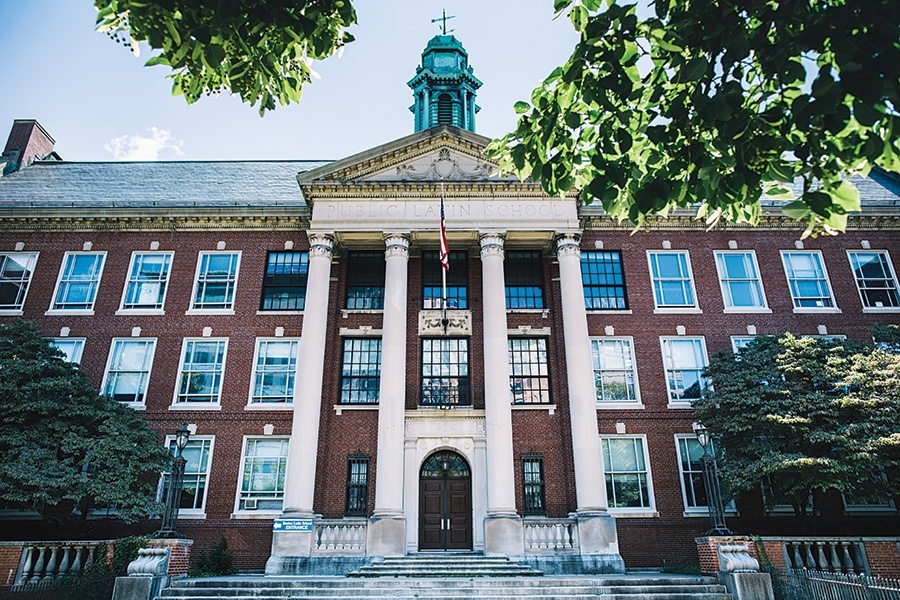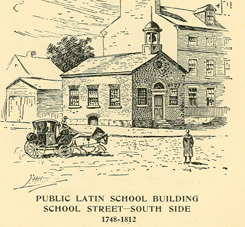Opportunities and Mischief in Adolescence
Edith was well-aware of the importance of academic opportunity. According to Tripp's wife, Jeannette, this instinct was integral to her son's future “And I think that's something Tripp's mother knew; that she had to take her child out of that environment and get him into an environment where it would be a lot easier for him to progress as she wanted to and as he wanted academically." After only a couple of years in North Carolina, Edith took Tripp back up north to Boston, Massachusetts. Though this was undoubtedly a beneficial move for Tripp, his early adolescence in Boston was not without its own problems. Though Tripp was a strong student with a bright future ahead of him, he inherited from his mother a certain disregard for rules and tendency towards mischief. Not only that, but Boston came with its own set of racial prejudices and racial norms. Carrying his early experiences from the south with him, Tripp developed an early appreciation and sensitivity towards different cultures and norms that would shape his future interests and travels.
In the seventh grade, Tripp was enrolled in Boston Latin School. Founded a year before Harvard University, Boston Latin School is the oldest and one of the most prestigious public schools in the nation. While the secondary school typically required an entrance exam for admission, Tripp, carrying a report card of all As, was admitted without the exam. Here, Tripp cemented the foundations for his later academic career, taking an early interest in languages by studying Latin. He also developed his love for fun and trickery, which often got him into trouble. Thus, despite his good grades, Tripp once again changed schools, moving to Armenia, New York. This move granted him even greater odds at upward academic mobility, but also hemmed in his antics:
"I stayed in Boston Latin School for three years and my grades were good, but I was always pulling pranks. And they had a system of misdemeanor marks. If you did something bad and if you did a certain number, got a certain number of misdemeanor marks, you would get a censure. And at some point, if you had two censures, they would expel you. And at the point when I had three censures, my mother decided that I wasn't going to be there very long. So, she went to a place where it focused on putting Black children into private schools. And there was a private school called Barlow that was looking for Black students. It was in Armenia, New York, which is about two hours north of New York City."
At Barlow, Tripp would undergo a more disciplined and rigorous academic regimen. Under a strict headmaster who encouraged both athletic and scholastic training, Tripp would take up soccer and continue pursuing languages. By the time Tripp entered his first year of college, he had under his belt four years of Latin, three years of German, and two years of French. Moreover, he had developed an early appreciation for high culture, particularly operas, from his dorm master. Barlow proved far smaller than Boston Latin School, numbering roughly sixty students. Tripp's largest classes had but twelve students, leaving little room for shenanigans or pranks.
"And I think that's something Tripp's mother knew; that she had to take her child out of that environment and get him into an environment where it would be a lot easier for him to progress as she wanted to and as he wanted to academically."
— Jeannette Miller
Notably, even in New England, race was still a factor in Tripp's early adolescent life. He and Jeannette contrasted the racial dynamics of New England to those in certain southern cities, where there existed large Black, middle-class populations. Cities like Durham felt close-knit and had robust social and economic fabrics; Jeanette recalled that the Blacks who felt the most segregation were those who were less privileged and lived closer to impoverished white communities. So, while anxieties of physical harm and danger were real and felt by Black teenagers growing up in the south, they were not uniform and could vary significantly from place to place. In Boston, Tripp was conscious of the fact that he was the only Black student in Boston Latin School. During the interview, he recalled that "Boston was very racist, because the largest groups, other than Jewish, in the city were Italians and Irish. And the Italians and Irish were very racist." Should he have wanted to wear his Boston Latin School jacket, for example, he would run the risk of being beat up in certain parts of the city.


